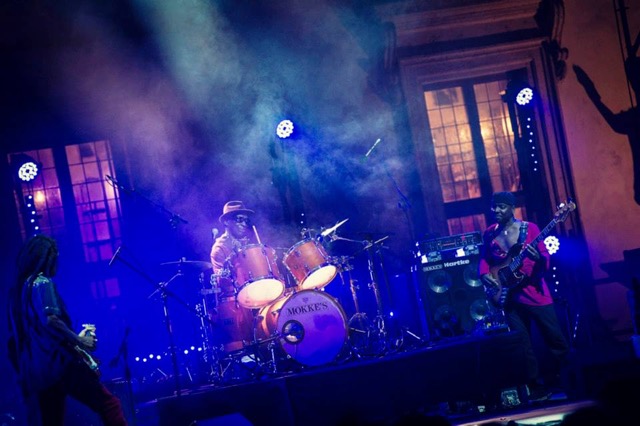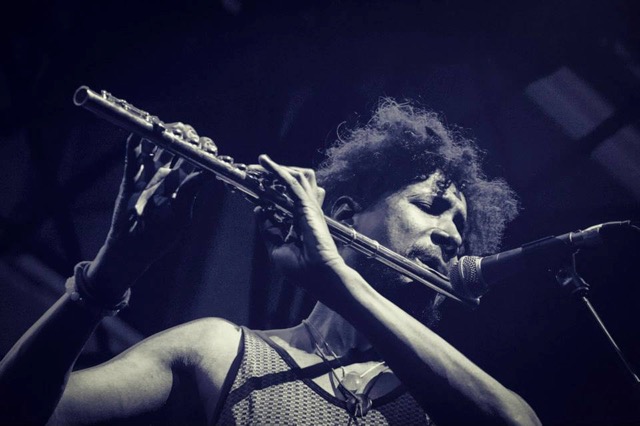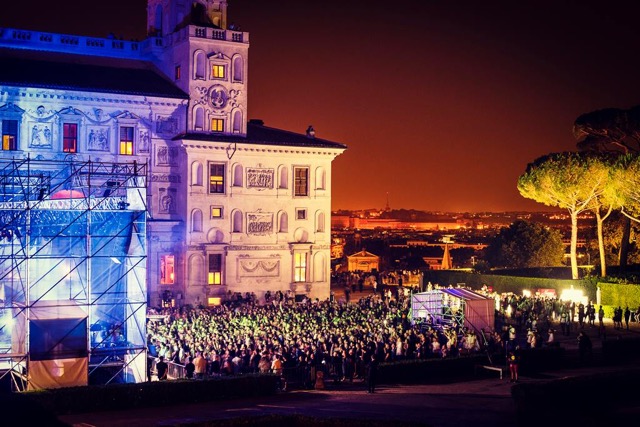
‘Would you like to start now?’. The question sounds rather unrelenting as it comes through my window around sunset on a grey and hazy Sunday afternoon. If it had referred to Tony Allen’s concert, which I attended recently at Villa Medici, I would have responded ‘Right away!’ so I could enjoy another combination of the refreshing pleasure of his afrobeat. Tony Allen is one of the greatest percussionists and drummers that Africa has ever known. He performed with his band during Villa Aperta, the electro-pop-rock music event founded by the French Academy in Rome and now in its sixth edition.
[youtube id=”jTeZNuvlxzU” width=”620″ height=”360″]
This got me to thinking about the relationship between the visual arts/music, Villa Medici and Rome. Founded in 1666 by King Louis XIV, the French Academy has been hosted in many buildings before settling in its current home on the Pincian Hill. Artists were once sent to Rome to learn how to create perfect replicas of Roman sculptures and the paintings of Italian masters in order to adorn the homes of French royalty. Music became a part of Villa Medici in 1830 when the Académie des Beaux-Arts decided to extend the Prix to Rome and include this art form. The award was given to Hector Berlioz who, upon his arrival, had complained profusely about the musical barrenness of Rome.
Berlioz praised Rome and the panoramic view from the Villa, one of the world’s most breathtaking sights, but he could not possibly ignore the city’s intellectual lifelessness nor the improbability of meeting people he could connect with. This sentiment was also shared by other composers such as Charles Gounod and Claude Debussy, who had resided at the Villa. Georges Bizet was an exception, however. He had no trouble identifying with the city’s soul and radiance and was a habitué of the Caffè Greco.
The task of freeing the Villa from the musical lethargy that was consuming it can be clearly seen through the work of Balthus, a painter of Polish origin who directed the Villa from 1961 to 1977. He constantly tried to support his position as director with his artistic output and active exchanges with many of the scholarship recipients. He was a very close friend of Federico Fellini and once commented that «…restoring all of Villa Medici’s former prestige has been an authentic obsession for me. It was an issue that had to do with my spiritual life and a way of preserving life. My friend Fellini had grasped that and used to say that he saw me as the caretaker of the heritage in which history has set the culture of mankind»1
Under his direction, the Villa hosted the Rolling Stones with Marianne Faithful. Michael Levinas even composed “Ouverture pour une fête étrange” in honour of the ‘strange’ parties held in the gardens and as an ode to the renewal and the Dionysian replenishment of the Villa.
Current director Eric De Chassey, oversaw the inauguration of a 2010 season dedicated to musical culture in all of its forms without ever shying away from commercial and less élite musical trends. The first exponents of “contemporary” music to obtain a residence here wereClaire di Terzi, Magic Malik and Bruno Mantovani – all musicians capable of fusing pop, jazz, lyrical virtuosity and electro-acoustic technique.
2010 is also the year that launched Villa Aperta which, for its sixth edition (4-6 June 2015), hosted – among others – Malik Mezzadri, known as Magic Malik, talented Ivorian flautist, composer and jazz man who lived as a resident at Villa Medici in 2010. We spoke with him and we shared opinions about the way music is interpreted these days and the other musicians’ relationship with Rome and the French Academy. We could view Villa Aperta as a morphic resonance of a musical past introduced in the 19th century by the Prix de Rome.

Elena Abbiatici: How did your residence at Villa Medici influence your composing style? Were you able to build relationships with interesting musicians and thinkers… considering how limited the music scene is in Rome and all?
MM: To be honest, I didn’t meet any musicians or artists outside of the Villa. I tried to stay as concentrated as possible on where I was during my stay. However, getting to know the other boarders studying with me that year and meeting guests of the Villa really got me to thinking. I wouldn’t know how to explain how Villa Medici influenced my composing, though. I can only say that it gave me a chance to compose, especially by starting off with traditional written documents – a method that I would like to practice more and more – the way of understanding my ability and motivation toward this aspect of musical activity. I intend to dedicate more time to this in upcoming years.

How did it feel to perform on the stage of Villa Medici after having lived there for so long?
The Villa is a place that I love deeply. Not only because it preserves a story but especially because it preserves part of my own story. I was a spectator at the first edition of Villa Aperta during my residence. This year I had the pleasure of inviting DJ Oil, an old companion of mine and fellow electronic musician, on stage with me. First there was this great desire and then this great pleasure to be back at the Villa and share my music in a place I love.
What is your view of music and its integration with the visual arts?
I believe that artistic expression has an exclusive essence, in general. I like dance without music and I like to see images separately etc. except for when artistic expression puts several fields of perception to use and inserts them into a hybrid form in which the elements cannot be separated. But this happens very rarely. Often music is written “on” an image or we dance “to” music etc.
[youtube id=”pCAmxAQGLes” width=”620″ height=”360″]
What is your opinion of free music streaming sources like Spotify or Deezer? Is it an advantage or a disadvantage for music? Do you think that the number of pieces uploaded everyday offers the possibility of discovering quality music or does it do the exact opposite?
I think everything should be available on the free market in our society. Work products shouldn’t be converted into monetary value but reinvested into new results of general interest. The concept of purchasing power is an illusion that only benefits a handful of millionaires and billionaires. It aggravates those people who see that their artistic creations are a part of the capital, a profit-maker and crushed by the “science of mass manipulation”. We need to generate individual profit for the few and believe that every individual has a different process. As far as my music is concerned, profits are irrelevant and free access to it is advantageous to the diffusion of our artistic expression. I would rather lose a few euro and have my music distributed than earn a few more euro and have it reach only those who can afford it. Maybe the ones who are bothered by these streaming sources are the ones who distribute, sell and collect copyrights. They’re the ones who set the prices and prosper from the sales of works of art. Even when artists are paid amounts that fill the middle and lower classes with envy, the ones who really benefit from the sales are the editors, producers, distributors etc. When the only thing an artist has is his or her music to live on, that’s when you’re really setting an example for many!
[1] Balthazar Klossowski de Rola, known as Balthus, Director of Villa Medici from 1961 until 1979, http://www.villamedici.it/it/villa-medici/direttori/b/balthus/
Images (cover) Magic Malik performing at Villa Aperta © Officine K (1) Tony Allen performing at Villa Aperta © Officine K (2) Magic Malik performing at Villa Aperta © Officine K (3) Villa Aperta 6′ Edizione, Villa Medici, Roma, 4-6 giugno, 2015 © Officine K.







































